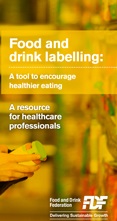Why nutrition and health claims can be trusted
A nutrition claim is any claim which states, suggests or implies
that a food or drink has particular beneficial nutritional properties.
These are set out in European legislation and are scientifically substantiated allowing people to have full trust in their legitimacy[1].
Food and drink manufacturers can only make nutrition claims if they are from the
approved list and meet the conditions around their usage (e.g. a minimum level
of that nutrient within the final product)[2].
Examples of approved nutrition claims include:

A health claim is a statement about the positive effect a product can have on
health. Claims which appear on pack have been approved by the European Food
Safety
Authority (EFSA), the EU risk assessment body for food safety[3]. An EFSA
approved
list of health claims has been published by the European Commission; any
additions to this list must undergo a thorough approval process including the
submission of a scientific dossier to EFSA for review.
Examples of approved health claims include:
- Beta-glucans contribute to the maintenance of normal blood cholesterol levels
- Calcium is needed for the maintenance of normal bones
- Folate contributes to maternal tissue growth during pregnancy
- Iron contributes to the reduction of tiredness and fatigue
IMPORTANT: Nutrition and health claims are based on science and can be trusted.
Notes
1. This piece of legislation is called ‘Regulation (EC) 1924/2006 on nutrition
and health claims’ made on foods.
2. The most up to date list of permitted nutrition claims can be found within
the EU Register of nutrition claims.
3. An authorised list of health claims has been published in the Register by
the
EU. The only non-authorised health claims remaining on the market are botanical
claims and claims for which additional data is currently being assessed.
Section 4: Tip #1
If someone is trying to improve one aspect of their diet, nutrition or health
claims can make it easier for them to spot appropriate products, e.g. finding a
bread that is high in fibre. The nutrition label will give them information on
other nutrients.
